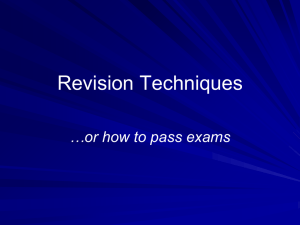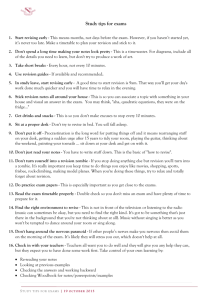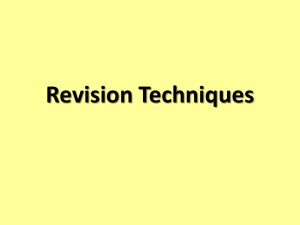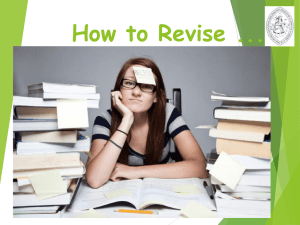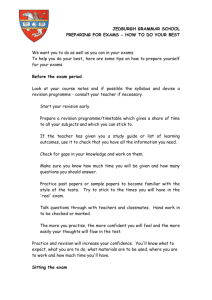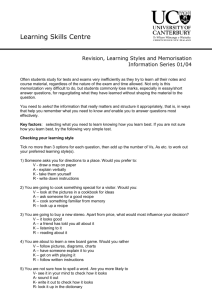What are Year 7 Examinations and why do we have
advertisement
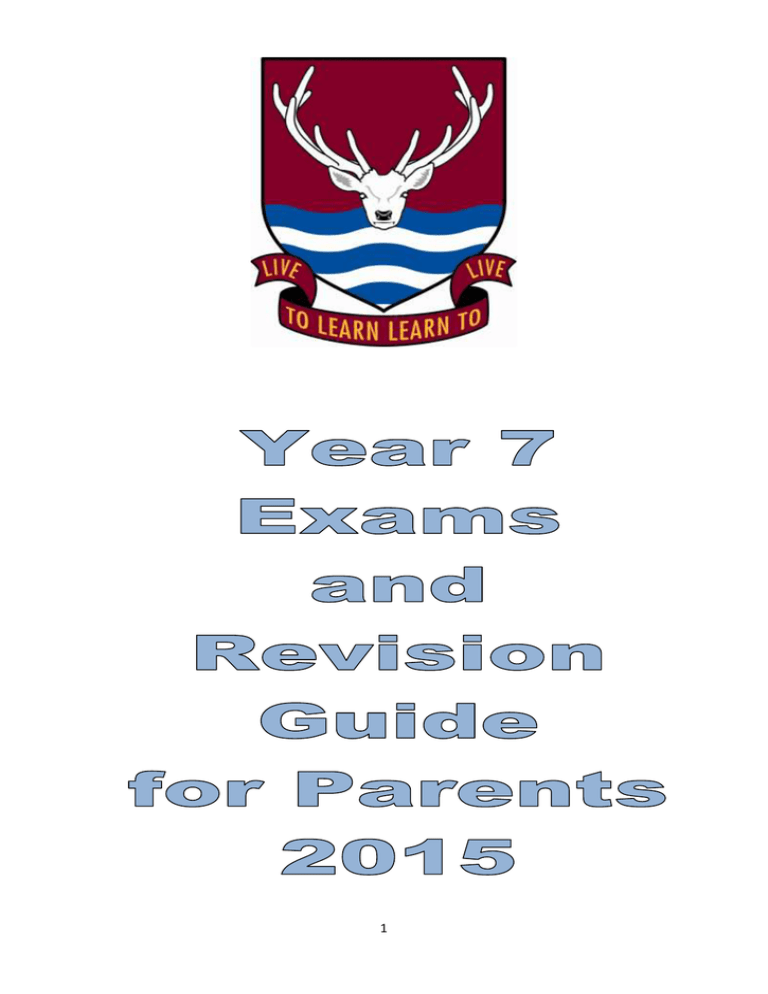
1 Dear Parents, Examinations can be stressful, so it is important that you know how to support your child so they feel able to cope over the exam period. You can’t do the revision, but there is plenty that you can do to help your child get organised, stay calm and keep motivated. Work with your child. Set goals you both think are realistic in a particular time, and try to keep up to date with how he or she is getting on. A student friendly version of this guide will be given to them during an assembly. Included in their guide will be tips on how to revise. The results of the examinations will be given to the students in their lesson, and will be reflected in their current levels in their next Progress Tracker. Gayle Raybould Assistant Headteacher graybould@tring.herts.sch.uk 2 Contents Page 4 What are Year 7 Examinations and why do we have them? 4 Revision timetables 5 Creating the right environment 6 Getting them motivated 7 Staying calm 8 Do’s and Don’ts 9 On the morning of the exams 9 What happens before and during the exams? 10 What happens to the Year 7 Examination results? 10 Exam timetable 11 What should my child revise? 3 What are Year 7 Examinations and why do we have them? It is important that students are prepared fully for their examinations that take place at the end of Key Stage 4. They will already have taken exams at the end of Key Stage 2, but they will not have had a period where they are revising for a number of exams in one go. The more practice they get at taking examinations, the better prepared they will be for their GCSEs. Part of the preparation is planning revision programmes, knowing what they have to do when they enter the exam hall, and knowing what equipment they need and the revision they have to do. The Year 7 examinations are a reflection of how they will be examined at the end of their courses in Year 11. As well as preparing the students for their examinations, it also gives our KS3 teachers the chance to check on your child’s progress. Although our KS3 teachers are checking their progress continually, this is an opportunity to see how they perform in each subject in more formal conditions. Revision timetables Your child needs to plan the free time that they have for revision. However, it is also important that they plan into this some breaks and other activities in order to relax and wind down. Planning revision and having some down time will help control stress, which this guide deals with later on. Students who do not plan revision often end up spending time covering areas that they already know well. A proper revision plan will help focus them on the subject areas they really need to cover. A really good website is www.getrevising.co.uk 4 This website creates a colourful revision timetable that is easy to read and only requires you to input when the exams are, plus any other commitments that your child may have. They need to allocate more time to the exams that they feel less confident about. Doing this will have a big impact on their eventual results. The timetable needs to be somewhere prominent, and the rest of the family need to know about it to help your child stick to their plan. Creating the right environment Creating the right environment without distractions can be hard in these times of mobile communication. However, it is important that the area that they revise in is distraction free and conducive to learning. Give them space to revise. They will need a room or an area that they can store books, equipment and if necessary, a computer to work on. Wherever they work, it needs to be a quiet area, although some students do work better if there is light noise such as quiet music in the background. Ensure they are away from the TV, Facebook, mobile phones or siblings that may take their attention elsewhere. Don’t let them study with the TV on. They will continually be distracted. Natural light is better, but they will need somewhere that is well lit and quiet. And make sure they have everything they need beforehand. They may use any excuse to procrastinate! 5 Getting them motivated Getting started is probably the most difficult thing to do, which is why a revision timetable can be helpful in planning their time. But once they begin their revision keeping that momentum up will be important. Short term and long term goals are really important in helping to motivate them. Students sometimes feel that Year 7 examinations are not important, but they are (later in this guide it explains how the results are used), and it is important that the exams are used as practice for GCSE examinations. Praise and rewards work really well (obviously!). Use the revision timetable to plan out small rewards when a certain number of targets have been met. These might include watching a favourite TV programme, going for an evening out with friends, or having access to a website. Reassure your child that you value their efforts more than perfect results. Help your child see beyond the revision too. Remind him/her what they will get out of good results with a long term vision. A bigger final reward can also help, such as a pair of trainers, a short break, or a visit to a local amusement that they have wanted to go to. It will give them something to look forward to when it’s all over. 6 Staying Calm The best way to support your child through the exam period is to make home life as calm and pleasant as possible. It helps if other members of the household are aware that your child may be under pressure and that allowances should be made for this. Try not to nag or make too many demands on your child during exam time. Arguments are counter-productive and will only add unnecessary stress, as well as distracting your child from revision. As far as possible, try to make sure that revision time is quiet time. A healthy diet and regular exercise are also especially important when your child is under pressure. If your child is highly motivated, it is important to make sure that he or she doesn’t overwork. Breaks are essential. Remind your child that even a short 15-20 minute break every 90 minutes will refresh his or her mind. Making a drink, playing some sport, listening to some music or watching TV are all good ways to help relax before the next revision session. It’s a good idea to set an alarm to remind them to stop and take a break, particularly if they haven’t had anything to eat or drink. Studying in a group can be helpful as they can bounce ideas off each other, but it’s a good idea to supervise them from a distance if you can so as to keep them on task. Children can pick up new ideas, talk about exam stress and help each other with areas that they find difficult. If your child is completely stuck on a topic, remember to tell us at school. Their teacher will be able to offer extra help and advice. 7 Encourage your child to get plenty of sleep and take regular breaks when they are revising. The brain will work better when rested Trying to cram in last-minute revision the night before the exam is a bad idea. This can cause panic, and might even affect his/her performance the following day. It is much better to do some revision but to make plenty of time to have a relaxing evening so he/she can do their best the following day. Exercise, even a walk to the shops, will help your child to concentrate when he/she gets back to work. It can also help him/her to sleep better. Discourage your child from drinking caffeine-rich drinks like tea, coffee or coke the evening before. It can disturb sleep. Make sure you set an alarm for the next morning. Waking up in a panic or even arriving late for an exam only makes things stressful. It is important to eat a healthy diet all the time, but during exam times this is vital. Eating well will help your child to focus and do his/her best. Try to discourage your child from eating lots of sugary snacks, as these can actually stop him/her from concentrating. Do’s and Don’ts Do Ask your child what areas/subjects that he or she wants help with Make your child feel you are there for them physically and mentally 8 Organise some non-study activities for him/her Encourage them with praise and rewards Make their environment revision-friendly Don’t Force them to revise in the way that you think best Put extra pressure on them Keep telling your child how much better organised you were about revision when you were that age! On the morning of the examination Set an alarm clock and make sure that they are ready in plenty of time Try to ensure that the household is as calm as possible. Make sure that your child eats something. They may not feel like it because of nerves, but having something to eat will help kick start their brains. Check that they have all of the equipment that they need for the exams that day. For example, do they need compasses or a calculator? Check that they know what time their exams are and which ones they are doing What happens before and during the exams? Before the exam, students will line up outside the Desborough Hall where they will take place. If the students are doing their exam elsewhere they will be told beforehand or collected by a member of staff from the hall. They will be asked to leave their bags outside (so please ask them not to bring in anything valuable during this period). Whilst in the hall they will 9 be asked to place any mobile phones under their table (turned off) and then given instructions for the exam. At the end papers will be collected in and returned to the class teacher to mark. Whilst in the examination hall, they should remain silent. What happens to the Year 7 Examination results? Although students understand the purpose of the examinations, some feel that they aren’t as important as GCSE examinations. This is an incorrect assumption for a number of reasons, and this will be highlighted to the students over the coming weeks: The more practice that students get in preparing for the exams, the better they will be at revising, and they will therefore be better prepared for their GCSEs Year 7 exams are used in order to make sure that students are in the correct ability set and pathway, it is therefore really important that they try their best for all of the exams. Exam Timetable On the next page you will find the timetable and what they need to revise for the Year 7 examinations. Students should attend school at the normal times, and attend tutor time in the mornings. This is important as notices may be given out about the exams during these sessions. Where students do not have an exam, they are expected to attend lessons. Where they are absent this will be followed up by their Head of House as normal. Some lessons will provide the opportunity to revise for an exam, however students shouldn’t assume that they will get the chance to do this, and should do their revision at home. 10 If your child is ill on the day of the exam, please telephone the school as soon as possible and let us know. In most cases arrangements will be made for them to take the examination at another time. All subjects that are not examined formally in the Desborough Hall (such as practical subjects) will be tested in lessons. Subject Topics to revise Maths Space, shape and measure, handling data, algebra, the Group 1 number system and making calculations will be tested at Tuesday 21 April an appropriate level for each student. 11.00-12.30pm The MyMaths booster packs are an excellent resource for revising a wide range of topics and practising using Group 2 different methods Wednesday English Science Date exam of 22 April 11.00-12.30pm Reading and interpretation: reading a range of non- Tuesday fiction texts to familiarise yourself with 21 April conventions/features of style; identifying devices used 8.40-10.40am in a text; using quotes to support analysis; explaining how and why and writer has used a particular device to create an effect on the reader; exploring and explaining the writer’s viewpoints/opinions. Creative writing in a style suited to the task: familiarise yourself with a range of fiction and non-fiction texts and their features, write short stories, persuasive speeches, letters and other types of text, practise paragraphing; structuring work carefully and for effect, experiment with having an engaging opening, a detailed middle and effective ending; control and vary your sentences; develop your vocabulary and choose ambitious words carefully; practise punctuating sentences; revise key spellings. Students will need to make sure that they learn the Thursday following things: 23 April What are acids? 8.40-9.40am What are alkalis? What happens when you add an alkali and acid together? What reaction is it called? When do magnets attract? When do magnets repel? What is the relationship between surface area and heat loss? 11 Why data loggers are better than thermometers? What is a balanced diet? What are muscles? What is blood made up of? History Geography PRS French Students need to practice the following skills: Analysing graphs Drawing lines of best fit and curves of best fit Recognising Independent/Dependent variables and Control Variables Writing a conclusion from a set of data Planning an experiment History skills i.e. primary & secondary sources, why people were pushed & pulled to England, 1066; include the 3 contenders for the throne and the Battle of Hastings. William the Conqueror and how he controlled England i.e. castles, Domesday book, Feudal system. Geographical skills, the world, weather and climate, Fair Trade Thursday 23 April 2.20-3.05pm Wednesday 22 April 2.20-3.20pm Tuesday 21 April 2.20-3.05pm What are the six main world religions? What are symbols? What do different people believe God is like? Why do some people not believe in God? (e.g. evolution, evil and suffering)? How and why do believers worship? How and why do believers treat Holy books with respect? What are places of Worship like? Greetings Wednesday Items in your bag 22 April Colours 8.40-9.40am The alphabet Age Dates Months Days of the week Numbers 0-100 Classroom instructions Countries Nationalities Family members Physical descriptions personality pets School subjects Opinions Time 12 German Spanish D&T Greetings Items in your bag Colours The alphabet Age Dates Months Days of the week Numbers 0-60 Classroom instructions Countries Family members Physical descriptions personality pets School subjects Opinions Time Food and drink Greetings Items in your bag Colours The alphabet Age Dates Months Days of the week Numbers 0-31 School subjects Opinions Items in a classroom Classroom instructions What you do in class Family members Physical descriptions personality pets Countries This will be a designing question based on the theme of ‘Easter Products’. Students will need to come to the exam prepared to create design ideas based on the theme, so should think of a range of different products associated with Easter. Students should make sure they know how to annotate their ideas to achieve higher levels of designing. 13 Thursday 23 April 11.00-12 noon Friday 24 April 8.40-9.40am Friday 24 April 11.00-12 noon Students will need a range of drawing equipment, including coloured and graphite pencils, an eraser, ruler and a pen for the annotation. 14
